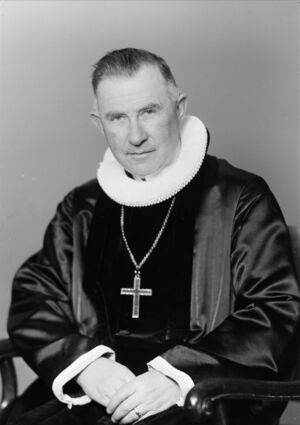Eivind Berggrav
( priest) | |
|---|---|
 | |
| Born | 25 October 1884 Stavanger, Norway |
| Died | 14 January 1959 (Age 74) Oslo, Norway |
| Nationality | Norwegian |
| Alma mater | University of Oslo |
| Religion | Lutheran |
| Children | Dag Berggrav |
| Spouse | Kathrine Seip |
| Interests | • Northern Norway • Otto Ruge |
| Relatives | • Didrik Arup Seip • Hans Seip |
Norwegian Lutheran bishop who cooperated closely with the military intelligence service | |
Eivind Josef Berggrav was a Norwegian Lutheran bishop.
Close cooperation with military intelligence
As bishop of Hålogaland in Northern Norway (1928–1937), Berggrav was a keen adherent to the policy of Norwegianization of the Sami and Finnish-speaking minorities.
Berggrav was particularly concerned about the Finnish-speaking Kven population group as a security political danger. He entered into close cooperation with the military intelligence service in Norway and linked intelligence and the church closely together. The bishop was given a central role in the collection of information about these in the diocese. His most important listening post was in Vadsø in Finnmark The information was usually collected by priests and teachers.[1]
World War 2
Berggrav was Bishop of Oslo from 1937 until 1951.
Berggrav was one of several social leaders who became involved at the outbreak of war in 1940. Berggrav had stayed in Finland after the Winter War ended and was in Helsinki on 9. April, when German forces landed in Norway. He arrived in Stockholm on 9. April and was there recommended to travel to Hamar to join the government that had fled from Oslo. He instead chose to travel to Oslo on 10 April and heard about Quisling's radio speech the night before. Berggrav believed that Quisling had to be removed as quickly as possible to avert civil war. Immediately after the invasion, Berggrav sent a circular to the priests in the diocese with a request to carry out their ministry calmly and soberly. In the weeks after the invasion, he had meetings with leading figures in Oslo, including his brother-in-law Didrik Arup Seip (then rector of the University of Oslo), Supreme Court Justice Paal Berg, Gunnar Jahn and County Commissioner Christensen.[2]
He played an important role in the establishment of the Administrative Council, a "neutral" council of prominent citizens collaborating with the German occupying forces since the government had fled, and was involved in the proceedings until 17 June. Because of his role in connection with the Administrative Council, a some radio speeches he gave and a trip to Nordmarka where he shouted with a megaphone to the Norwegian forces to lay down their arms, many Norwegians had the impression that he collaborated with the occupying power. He was therefore exposed to criticism in his lifetime, including from the church itself.
Eventually he led strong ecclesiastical opposition to the Nazi church order. Berggrav played a central role in the Church campaign against the occupation and the puppet Quisling government. He was put under house arrest from 1942 until 1945.[3]